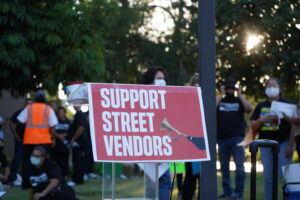
Shaped by Street Vendors
by Dianna Caal-Requena
One in five residents in the Inland Empire are immigrants. One in five. Immigrants are part of the fabric of our community; they are our neighbors, friends, colleagues, and are in every school, grocery store, and doctor’s office you may visit. According to the State of Immigrants Report by the Center for Social Innovation at UCR, Immigrants began moving to the Inland Empire in various waves to flee racial discrimination from the coastal counties of Southern California and in hopes of pursuing opportunities that were blooming in the IE with the rise of agriculture and construction. As citrus specifically began to strengthen the economy of the Inland Empire, the immigrant population served as its backbone. Agriculture remains one of the most significant streams of income and elements in our economy today – and is still backed by immigrants.
With the drive to seek new opportunities, immigrants naturally took on the roles of entrepreneurs, opening small businesses throughout the region in the forms of taco and fruit stands, ice cream carts, brick-and-mortar restaurants, and much more. The sight of a rainbow umbrella or the ring of a bell now means much more than supporting a small business or indulging in a sweet treat; rather, it is an integral part of our culture and identity in the Inland Empire. Immigrants, in their own way, have created new economies with systems being against them – thus, giving us an edge. The innovation and creativity of immigrants have helped the Inland Empire become the leading region in Southern California’s economic growth.
Street vendors are also key contributors to the Inland Empire culture and community. They have gained social and legal acceptance in California through SB 946 and SB 972. The two laws have been passed to stop the criminalization of sidewalk vending in California and allow vendors to obtain permits legally from their local health department, thus legalizing the sale of prepared food on the street. As part of SB 972, Governor Newsom recognized not only street vendors, but immigrants, as a vital part of our economic growth. Though these laws have helped formalize these businesses, there is still a lack of protection to ensure the safety and prosperity of these small businesses, and attacks and criminalization of street vendors have not stopped.
Vendors continue to live and work in fear knowing there are little to no protections from being robbed or attacked on the street, and much less have any support from law enforcement. Vendors continue to receive citations without explanation, law enforcement confiscates equipment, and violates due process. Those with ill intent, including cities and counties that try to circumvent state law, will continue to harm vendors until severe consequences are in place. Policymakers must put forth policies that protect vendors’ property, jobs, and livelihood.
It is the responsibility of elected officials to ensure the safety of all in our community and foster growth, entrepreneurship, and economic development for all. We have the opportunity to advocate for both our community members and the culture in the Inland Empire by uplifting street vendors and entrepreneurs.
Next time you see a street vendor, patronize their business, listen to their stories of resilience, ask questions, and offer your support to them individually. Take action by joining groups that collectively advocate for street vendors, such as the @ICIJ and California Street Vendors Coalition. For more information, visit ic4ij.org/streetvendors.
